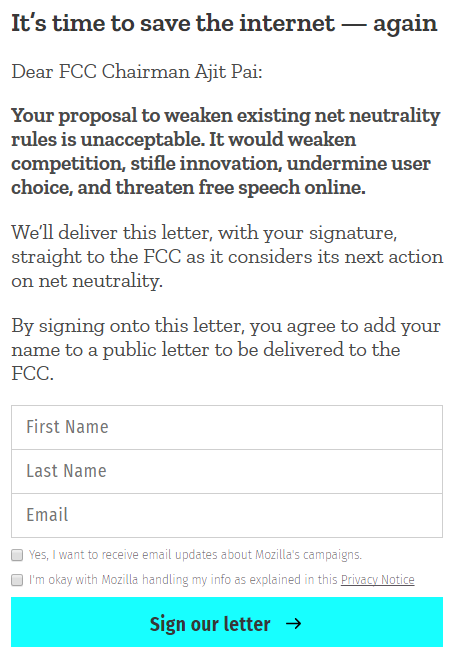Net Zero - Should I Care About Net Neutrality?
By now, the FCC’s net neutrality vote is old news. That was, at the time of this writing, almost a month and a half ago! However, I don’t think anyone understands it now any better than they did then. Net neutrality is far more complex than most people give it credit for. Whether they’ll admit it or not, to most people, it’s just another political gimmick. Something else to get “excited” about when you’re really, really, bored. Or something like that.
What was I talking about again? Oh yes. Something about the FCC? The Federal Communications Commission is a U.S. government agency whose purpose is to regulate interstate and international communications for U.S. states and territories. That means that anything classified as a “communication” which travels either from one state to another or from the U.S. to another country is subject to FCC regulation. Without getting into the gory details, it suffices to say that there are five commissioner positions with varying responsibilities in the FCC, and that the president of the United States is responsible for their appointment. In addition, he selects one of these commissioners to chair. Generally, the senate must confirm these presidential nominees. However, President Trump was able to give Ajit Pai, a Barack Obama nominee, the chairman position without the senate’s explicit approval because they had already approved his nomination as a commissioner during President Obama’s tenure (Byers). This is why news outlets like the Washington Post and The Verge are able to refer to Ajit Pai as “President Trump’s new FCC chairman.” While technically accurate, the political nature of that choice of lingo is decidedly obvious, especially in context.
In any case, the facts remain facts. On the 18th of May, 2017, the FCC voted to reassess net neutrality regulations, with the goal of “restoring internet freedom” by reducing regulations. Practically, this means that there is a 90 day comment period during which the public is encouraged to comment directly to the FCC with arguments for or against net neutrality. We’re about halfway through that at the time of this writing. When the period ends, the FCC will draft a new set of rules and vote to incorporate the new rules into law. The FCC isn’t a lawmaking body, but they’ll vote to incorporate a bunch of new rules into something that a law already allows them to do. Or something like that.
So this vote happened, and NN regulation will be re-evaluated. Is that good or bad? Bigwigs on both sides of the debate are encouraging people to send comments in to the FCC, and there have even been reports of botted comments flooding the system.

In response, Pai’s fellow Republican Commissioner at the FCC commented that the number of commenters won’t be a factor in the FCC’s decisions. Rather, commenters should bring concrete arguments and evidence to their submissions, clearly proving that the NN rules either are or are not needed (Selyukh).
What are we going to do about this possible change to internet regulations? Does it even matter? Should we be looking at this more like we would a pebble accidentally kicked into a river, or more like we’d look at a dead shark purposefully launched into our backyard pool? Are we going to flood the FCC with comments inspired by our four hundred closest friends’ social media comments? Or maybe it’s safe to ignore the issue entirely? Net neutrality is a topic more complex than one status update or tweet can possibly explain. It might or might not be important for us to learn what it is, form an opinion, and maybe even submit something to the FCC - but we can’t know that without a deeper understanding of net neutrality than news and social media provide.
So, just what is net neutrality? While there is no universally accepted definition, one definition of strict net neutrality is that “Net neutrality prohibits internet service providers from speeding up, slowing down, or blocking internet traffic based on its source, ownership, or destination” (Kramer, Wiewiorra, and Weinhardt., 796). The debate then takes hold on all the different ways the resulting rules affect different aspects of the internet. Without NN rules, a two-sided market could evolve in which internet service providers (ISPs) would charge both content and service providers (CSPs) and internet users. These fees could just be “termination fees,” or money in exchange for delivery of a content or service to the ISP’s customers. That wording is a little funny, but apparently termination can mean getting something to a point, where it stops. In this case, Google, for example, would pay your ISP to terminate packets at your computer, thereby allowing you to access google services. That might not be so bad, but the fees might not end there. It’s possible that the fees ISPs would charge CSPs could even be in return for priority service, where companies with bloated budgets could order “fast-lanes” for their content, and lower-budget enterprises would be left in the dust. The legality of an ISP’s application of traffic management techniques to prioritize or even block certain traffic is also dependant on a lack of strict net neutrality. Finally, another issue in the NN debate is what the wider economic effects of NN rules are, specifically the effect on innovation in internet technology and on infrastructural investment.
Although the FCC rules on net neutrality will certainly affect myriad people outside of the FCC itself, the main voice in favor of rolling back and reassessing NN regulations would be Ajit Pai, chairman of the FCC. While Pai immediately concedes that he is in fact in favor of a “free and open internet,” he then clarifies that the current specific way of ensuring that could be problematic. What the FCC regulations of 2015 did is they classified the internet as a utility, allowing the FCC to regulate the internet under the Title II regulations. These “heavy-handed economic regulations” were established in 1934 to deal with the “Ma Bell” telephone monopoly. For that situation, the regulations were intended to be heavy, in order to prevent Ma Bell from taking advantage of the monopolistic situation and hurting consumers. But for today’s internet, the regulations might be too tough. In particular, Pai worries that the Title II regulations will ultimately discourage companies from investing in infrastructure to bring internet to low income, urban, and rural areas. And he’s not making up this worry: Besides for a 5% decrease in infrastructure expenditure among the top twelve ISPs, twenty-two small ISPs (with under 1000 customers each) told the FCC that current net neutrality regulations “hang like a black cloud over their businesses,” preventing them from getting the funding they need to expand their internet infrastructure (pbs.org).
Proponents of NN tend to be the people who would have to pay more upfront if the rules weren’t set in stone. For example, Google and Netflix are big advocates of NN rules. They, being CSPs, fear the costs that could come their way from all the different ISPs if the NN rules were abolished. Without NN rules, each ISP could charge Google and Netflix for access to its customers. Even if the function of the fee was limited to an access-our-customers “termination” fee, this would be a major expense to companies with major traffic. These companies would have to either foot the new expense from their current revenue streams or find a way to make back that money from consumers. Ultimately, this could lead to greater economic burden on consumers. After all, companies’ primary goal is to make money, not to maintain an ideal internet (whatever that might be). So if there’s a new cost to them, there will be a new cost to users to balance it out (Economides 92).
Google and Netflix may advocate for NN to stay under Title II regulations, but the truth is they aren’t in as much risk as every other company. Every year the internet grows. Content takes up more space and more users use more internet. If the Internet actually fills up to the point of exaflood, where there are too many exabytes of data trying to occupy a somewhat smaller space at once, an equal internet won’t be enough. The NN debate rests on this premise, that the amount of internet traffic will grow faster than ISPs can handle churning out new infrastructure with their current sources of funding (Kramer et al., 807). If NN regulations are not in place if and when this “exaflood” happens, there won’t be enough bandwidth to share equally. ISPs will be forced to prioritize something, and they will choose to prioritize those who pay them more. Essentially, this will create fast lanes for premium content. The problem is that premium means there’s a big enough company behind it that can afford to pay. Startups in particular could suffer terribly from this situation, as the cost of reaching internet users (IUs) could soar. Additionally, any lower budget enterprise could be affected - from local schools, to farmers markets, to bloggers. Hey, you’re reading this right now on my blog. And if I had to pay every ISP in the book to get my pages to load fast enough to be ready before you give up and go back to youtube, I might be forced to shut it down.
When presented with the arguments from big companies like Facebook, Google, and Netflix that the current system is fine, Ajit Pai waves them off, arguing that they basically agree with his ideas. They want a free and open internet, but so does he! They don’t care, he argues, any more than he does that Title II regulations be the method of maintaining NN. Whatever the FCC comes up with to replace that will be just fine for those companies, and other entities in favor of NN as well. “The internet was not broken in 2015,” said Pai. He argues that the kind of regulation which the current NN rules under Title II are - preemptive regulation - is the kind of regulation intended to fix a broken system. The hypothetical fast-lane issue is just that - hypothetical - so it doesn’t illustrate a broken system. Without “pretty concrete evidence of an overwhelming market failure,” the extra regulations are “like the proverbial sledgehammer being wielded against the flea. Except that here, there was no flea,” as the issue the regulation sledgehammer was targeting didn’t exist on nearly a large enough scale (pbs.com and Selyukh).

In an unsurprising contrast to the proponents, the major opponents of NN tend to be the people who would get more money if NN were to be removed. Namely, ISPs themselves, such as Comcast, Verizon, and AT&T. These companies enjoy local monopolies or duopolies over residential customers and can therefore charge them significantly more than they charge CSPs, which are often located in places with more competition. As the load on their networks increases, broadband providers AT&T, Verizon, and several cable companies have coalesced to demand more compensation for carrying traffic with a higher value. They want to be able to charge Google, Yahoo, and Disney an additional fee to access their internet customers. In addition, they want to be able to set different rates for different companies. For example, they want the possibility of charging Google more to give their respective IUs access to Google search than they would charge Microsoft to give their customers access to Bing. ISPs want to be able to prioritize all internet traffic based on how much money they’re making from that particular traffic. They even might block traffic that is completely useless to them or even competes with their comparable services if it were allowed. But of course, all this is against the principal of NN, so these companies want NN regulations abolished (Economides, 92).
When it comes to internet advocacy in general, the Mozilla Foundation and the Electronic Frontier Foundation (EFF) have been some of the loudest in various campaigns pertaining to internet freedoms of speech, privacy, and security, for example. In this debate, their voices are not absent. The EFF, in an article called “Dear FCC: We See Through Your Plan to Roll Back Real Net Neutrality,” points out that the same way Comcast won a court case in which it had breached net neutrality dictums before the Title II NN regulations were put in place, it and other ISPs will win court cases after Pai reclassifies the internet to an information service as it was then. They say that Pai can claim from today till tomorrow that he’s in favor of net neutrality, but his action - his vote, the first step to demolishing NN regulations - speaks louder (Kastrenakes).

That EFF article is pretty serious, and I’ll get back to that in a moment. But Mozilla’s appeal on the topic is laughable. They literally appeal to the internet-using masses directly as watchers of cat videos, arguing that without NN regulations, your ISP will decide when you’ve watched too many cat videos and slow down your internet for the rest of the day, causing you to fall

behind on, arguably one of the most important things on the internet, the latest Maru memes. Seriously, Mozilla?

So, the EFF and Mozilla are advocating in favor of NN. However, they’re doing it entirely wrong. I don’t even know how to respond to the cat thing. But ignoring that, there’s a key problem with how the EFF and Mozilla are taking on this issue. Both provide a way to get your name sent to the FCC in favor of the Title II NN regulations. However, neither method will help in the slightest, as the letter you’re adding your signature to is simply a number to Ajit Pai and the FCC. Mozilla presents us with the comment that “there are a million reasons why we must protect net neutrality” and then gives us four claims and zero evidence. The letter Mozilla has you sign is short and sweet:

Again, the letter contains four claims and zero evidence. Each of those four claims is subject to debate, and as mentioned above, the FCC specifically asked that all commenters to the FCC “provide evidence to support their arguments that the rules are or are not needed” (Selyukh). It’s nice that Mozilla is taking a stand, but no matter how many people sign their petition, they will just be a number, with no more weight than the botted comments that flooded the system the day it was put up. The EFF system is slightly better, as their FCC comment form at dearfcc.org does have a section where you can input specific arguments if you so choose. However, they label it as “why the internet matters to me,” which sets the whole thing up for failure (see below). Also, the EFF states in that article, linking to another 125 page article, that innovation has “flourished” under “Open Internet Order,” the name for the FCC’s 2015 regulations. Pai states in the PBS newshour interview that innovation has gone down, and he has 22 small ISPs telling him it has prevented them from innovation. Clearly, there is some sort of factual disagreement here. Somebody journalisty should get on that case.
Here is something that all these NN advocates seem not to get: Ajit Pai thinks he is on their side. Listening to that interview, it’s clear to me that he strongly feels he’s doing the right thing by reclassifying the internet again to remove it from the jurisdiction of Title II regulations. More importantly, he also strongly feels that he supports an open internet, and that the best way to advocate that going forward is to remove the Title II regulations in favor of a light-touch system where the FCC will target specific occurrences of ISP offences to NN ideals. This will get the regulations off the backs of over 4000 ISPs and restore the internet to the situation two years ago, where there is no evidence of widespread neglect of NN principles. So Mozilla, it’s nice that you will provide him with a number of people in favor of NN, but Pai & co. will feel that they know better. After all, they also want an open internet, and your X million people are just a bunch of concerned people who found a link on social media and gave you some personal information. Because your letter has no argument, only claims, but no evidence, the FCC can easily ignore even millions of submissions of this letter, as they know the industry better than you do. And you guys at the EFF? Pai will get tons of submissions which, in addition to claims without evidence, detail “why the internet matters to me.” Seeing this, Pai will be further inspired to do the best thing for the internet to his mind - removing Title II regulations. Sorry, but you’re just stoking the fire. That’s not going to get you where you intended. Title II regulation of NN will soon be a thing of the past.
The inertia of Pai’s plan doesn’t mean that it is perfect. Imagine you were teaching a class of kindergarten students. Every day, your thirty or so students traverse the halls of the school from your classroom to the field behind the school for recess. Along the way, there is a low wall covered with candy. However, you forbid the students from taking the candy, and they behave. One day, the school administration decides to put up a glass wall between the hallway and the candy shelf.

Now, your students can’t take the candy even if they want to. The reason they don’t touch the candy flows from their inner resolve toward the impossibility over time. But then, the glass wall is removed. Suddenly, your historically disciplined students “forget” your rule about not taking the candy. The wall comes down, and a day later there is no more candy on the shelf. Only after working with the students for a few weeks or months will you be able to retrain them to the level of self control they’d had in the past.
While I tend to see Pai’s side of things, I’d also argue that it’s the same thing with ISPs. Granted, the analogy is a little bit sticky. But ISPs know everyone likes net neutrality, so they’re okay with it on some level. They do their best to uphold its principles to the extent that they feel they can. They might apply traffic management, but if they do, they are really certain they are not slowing down anything dynamic down which would be significantly negatively affected. They sniff at the candy, but they don’t touch it. And everything is basically okay. Then along comes a democratic FCC and institutes a glass wall of regulations. Now, they can’t even smell the candy, and they can’t take it for fear of finding themselves in court. And everything is still basically okay, as long as you aren’t a small ISP trying to add to your infrastructure. But what Pai and the republican FCC wants to do - to take down that glass wall - could end up with all the children pocketing too much candy, to the point that the shelf - your wallet - is quickly emptied.
The EFF article (Kastrenakes) made one good point. Without the regulations, ISPs will win the NN court cases, just like they did before the Open Internet Order. I say that Pai will get himself into bigger trouble than he wishes for. True, there were no widespread NN problems before the Title II regulations were applied, but a lot can happen in two years to the technology world, and maybe it will be different when the glass shatters. Maybe Pai is right about the innovation aspect, but there will certainly be red tape and bureaucratic headaches immediately after the change. The law will get involved, and maybe Congress will be forced to take a stand if whatever regulations the FCC tries to impose are to win out. But it could be messier than Pai bargained for in the meantime. Perhaps he should be getting Congress involved from the start. If Congress gave the FCC regulatory power over the internet in a specific way that is not as limiting as the current regulations to the small companies trying to get financing for their infrastructure projects, and this was finalized before Pai messes with the Open Internet Order, all crises could - potentially - be averted.
There are certainly those out there who would disagree with me about Pai. I’ve seen a ton of comments on various news sites mentioning that Pai used to work for Verizon before he became an FCC commissioner. Given that fact, they claim Pai is in it for special interests, not for the interests of consumers. He’ll abolish net neutrality rules to the best of his ability in his last year as commissioner and chairman before taking another cushy job at Verizon or one of its subsidiaries in return for his enabling them to milk CSPs for some extra cash.
There’s certainly a ton of corruption out there, but I do not think Pai would go that far. Firstly, he’s not trying to remove net neutrality completely - he’s just trying to change how it’s regulated. Second, if after NN rules were demolished, Pai were to take a job at Verizon in 2018, that would be huge news, and any respect that anyone had for Ajit Pai would be instantly lost. Pai would not actively seek to destroy his reputation like that, even for a couple hundred thousand dollars. (Right?)
In any case, I maintain that Mozilla, the EFF, and other digital rights advocates are going about this campaign in the wrong way. We can’t have the FCC flip-flop on whether the internet is an information system or a utility every time a democrat or republican takes the presidency and appoints that majority to the FCC. The way the campaign is running now, the contributions from advocacy of the EFF and Mozilla will total net zero, or even motivate Pai in his current plan, against Mozilla and EFF’s NN ideals. If these and other advocacy groups would start encouraging the letters to take a different trend, maybe this could end in any way other than a complete removal of NN regulations. The EFF and Mozilla should urge people to write to the FCC asking them to seek out Congress before they make any changes. They should try to get official, limited-but-not-too-limited regulatory power over the internet directly, irregardless of its classification as information service or telecom utility. This could negate the controversy before any negative effects start to get out of control. Even without any change in campaign by big advocacy groups, you and I can possibly make a difference by bringing up this viewpoint if and when the conversation surfaces, and urging people to argue for early congressional involvement in comments to the FCC, or even by writing to your local House and Senate representatives.
This post is based on an essay done for an English composition class. This works cited section is included for reference.
Works Cited
Byers, Alex. "Trump Said to Elevate Ajit Pai to FCC Chairman." POLITICO. N.p., 20 Jan. 2017. Web. 22 May 2017. <http://www.politico.com/blogs/donald-trump-administration/2017/01/ajit-pai-fcc-chairman-233905>.
Economides, Nicholas, and Joacim Tåg. "Network neutrality on the Internet: A two-sided market analysis." Information Economics and Policy 24.2 (2012): 91-104.
"FCC Chair Ajit Pai Explains Why He Wants to Scrap Net Neutrality." PBS. Public Broadcasting Service, 27 Apr. 2017. Web. 23 May 2017. <http://www.pbs.org/newshour/bb/fcc-chair-ajit-pai-explains-wants-scrap-net-neutrality/>.
Kastrenakes, Jacob. "FCC Votes to Begin Overturning Net Neutrality." The Verge. 18 May 2017. Web. 23 May 2017. <https://www.theverge.com/2017/5/18/15657916/fcc-kill-net-neutrality-proposal-vote-passes>.
Krämer, Jan, Lukas Wiewiorra, and Christof Weinhardt. "Net neutrality: A progress report." Telecommunications Policy 37.9 (2013): 794-813.
McSherry, Corynne. "Dear FCC: We See Through Your Plan to Roll Back Real Net Neutrality." Electronic Frontier Foundation. Eff.org, 18 May 2017. Web. 23 May 2017. <https://www.eff.org/deeplinks/2017/05/dear-fcc-we-see-through-your-plan-roll-back-real-net-neutrality>.
Selyukh, Alina. "FCC Votes To Begin Rollback Of Net Neutrality Regulations." NPR.org, 22 May 2017. <www.npr.org/sections/thetwo-way/2017/05/18/528941897/fcc-votes-to-begin-rollback-of-net-neutrality-regulations.>
Selyukh, Alina, and David Greene. "FCC Chief Makes Case For Tackling Net Neutrality Violations 'After The Fact'." NPR., 05 May 2017. Web. 23 May 2017. <http://www.npr.org/sections/alltechconsidered/2017/05/05/526916610/fcc-chief-net-neutrality-rules-treating-internet-as-utility-stifle-growth>.